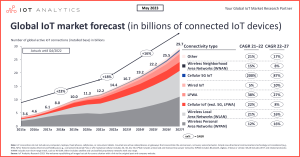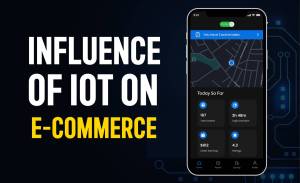The rapid emergence of the Internet of Things (IoT) plays a vital role in shaping the future of e-commerce. It unites physical objects through internet connectivity and advanced data collection capabilities. As observations reveal, IoT transforms how businesses track, analyze, and anticipate customer needs and augment the overall shopping experience.
“E-commerce & IoT are the modern-day amigos that can provide seamless experiences to its users and can help businesses thrive, no matter how dull the market gets.”
The article shares insights about the growing impact of IoT on e-commerce. It delves into strategies that e-commerce marketplaces can adopt to harness the full potential of this technological revolution.
What is one of the most talked about concepts — IoT?
Physical devices like gadgets, appliances, and vehicles possess embedded software, sensors, and connectivity. This integration enables the objects to establish connections and exchange data, defining the concept of interconnectedness.
Internet technologies have made it possible to connect physical elements to the network, which is the basis for developing the IoT (Internet of Things).
This technology allows for the collection and sharing of data from a vast network of devices, creating opportunities for more efficient and automated systems.
Is IoT the game changer?
Internet of Things (IoT) is the networking of physical objects that contain electronics embedded within their architecture to communicate and sense interactions amongst each other or concerning the external environment. In the upcoming years, IoT-based technology will offer advanced services and practically change how people lead their daily lives.
Advancements in agriculture, power, gene therapies, smart cities and smart parking management, edge computing, big data, medicine and healthcare, and smart homes are just a very few of the categorical examples where IoT is strongly established.
Today, with around 15 billion connected IoT devices worldwide, the figure, Oracle mentions, is expected to rise to a whopping 22 billion by the year 2025.
The latest IoT analytics report shows that global IoT connections grew by 18% in 2022 to 14.3 billion active IoT endpoints. This number is predicted to grow another 16%, leading to 16.7 billion active endpoints.
This growth for the year 2023 is slightly lower than it was predicted for 2022. Essentially, IoT device connections are expected to rise for several years to follow. These figures leave every stakeholder thinking about whether IoT is really the game-changer.
- IoT devices- Touching the ‘billions’ milestones
Image credit: Here.
IoT in E-commerce: Dictating new rules and pushing industry limits
- IoT’s influence on e-commerce has been huge
Image credit: Here.
IoT refers to a network of interconnected devices embedded with sensors, software, and network connectivity, enabling the collection and exchange of data with minimal human intervention. With billions of devices connected worldwide, IoT presents immense opportunities for e-commerce markets. This fac reshapes how businesses operate, manage operations, and engage with customers.
Research firm Gartner stated that IoT would result in a transformation of the world of delivery services. The magnanimous impact of IoT on e-commerce can be well gauged by the fact that the study stated that a thirty-fold increase in Internet-connected physical machines by 2020 will significantly alter how the sector works.
An example of IoT’s applicability in e-commerce can be comprehended by the fact that there are warehouse robots within e-commerce companies that work with machine learning algorithms. Machines can identify certain items within a cluttered environment and determine the best ways to pick them up safely and effectively.
Better Demand Analysis, Personalization, and Customer Engagement
IoT devices can collect vast amounts of data on customer behavior, preferences, and purchase patterns. By analyzing this data, e-commerce platforms can do a better demand analysis, create highly-personalized shopping experiences for varying consumer needs, and offer relevant product recommendations and targeted promotions. This level of personalization enhances customer engagement, eventually nurturing brand loyalty and driving sales.
The use of IoT has been pretty revelatory for businesses. Its use in information sharing helps firms better understand their customers’ needs and collaborate with them for better demand planning and ameliorated customer service. IoT helps to close the information gap in modern supply chains by capturing fine-grained information among organizational entities, processes, and people in real-time
Inventory Management and Supply Chain Efficiency
IoT enables businesses to implement data-driven inventory management systems using sensors, RFID tags, and real-time tracking technologies. These systems monitor stock levels, anticipate replenishment needs, and avoid out-of-stock situations. This ensures that the right products are available when customers demand them. IoT’s potential to streamline supply chain processes includes optimizing logistics, warehouse management, and order fulfillment, leading to improved operational efficiency, cost savings, and faster deliveries.
The cyber-physical systems (CPS), which are nicely integrated with communication, computation, and control systems,, can manage the inventory and make the supply chain free from bottlenecks.
By analyzing demand data and enabling self-decision-making algorithms for the machines in CPS, the production line can work efficiently with a minimum of direct human role and fewer errors in real-time interactions.
A paper published in Elsevier mentions that several scholars have investigated the potential of RFID for supply chain traceability, stating that RFID provides increased visibility, tracking, and enhanced communication throughout the supply chain.
The paper also asserts that businesses have myriad reasons to consider applying IoT in their supply chain models. The extant literature that the paper has produced establishes that IoT can be extremely useful. It can hep in tracking to locate products, materials, and assets, and to know their current status and environmental conditions. This is highly suggestive of the fact that herein, lie heaps of opportunities for e-commerce businesses.
Smart Warehouses and Automation
IoT-powered smart warehouses play a crucial role in transforming e-commerce operations. The integration of IoT devices like sensors, drones, and autonomous robots facilitates automation, enabling smoother processes and reducing human errors. These capabilities allow businesses to manage inventory more effectively, expedite order processing and shipping, and ultimately deliver better customer experiences.
With the challenges of storing and warehousing growing in abundance, one of the finest ways of combating such a situation is the automation and robotization of the warehouse system. On the one hand, automation expedites business operations and smoothens the storage and movement of inventory. On the other hand, robotization does not mean completely replacing human work with machines. Instead, it is about supplementing and increasing human work efficiency with robotic systems.
Consider the example of Amazon, a known tech giant in the e-commerce space. It effectively uses IoT installed robots that take care of picking, packing, and many other jobs, ensuring the product’s effectiveness. Amazon, in their warehouses, uses drones as well to pick up and deliver products. The engineers at Amazon are also working on a pinch-grasping robot. Tests showed a prototype achieved a tenfold reduction in product damage due to its gentle but secure grip.
Seamless Omnichannel Experience
The Internet of Things if utilized well by businesses, does lead to ameliorated omnichannel experiences.
Explicitly said, one of the primary benefits of IoT is its ability to create a seamless omnichannel experience for customers. As per a report published in Walker, a customer experience consulting firm, the customer experience will overtake price and product as the key differentiator by 2020 (and we’ve seen this). Standing in 2023, we know the importance of customer experiences (CX) and the joys they can bring. This speaks volumes about the relevance of customer experience (CX) in today’s customer-centric business world.
By synchronizing data across multiple channels, IoT allows e-commerce marketplaces of all natures — and sizes and brick-and-mortar stores to offer a unified shopping experience. Moreover, real-time updates and access to shopping carts, wish lists, and customer profiles ensure a consistent and personalized approach.
Conducting your businesses by leveraging the IoT devices should gather direct, up-to-date customer feedback to understand what matters most to them. They can then deliver as per the varying needs. IoT can be a game changer for businesses if integrated effectively, as it offers seamless omnichannel experiences.
IoT-enabled Delivery Solutions
IoT can potentially revolutionize the delivery process in e-commerce, from smart lockers to drone deliveries. Connected devices provide real-time location tracking, enabling businesses to monitor shipments and provide customers with up-to-date information on their orders. Autonomous vehicles and drones guided by IoT technologies promise faster, more efficient deliveries that minimize costs and enhance customer satisfaction.
Technavio market research report suggests that the autonomous delivery market is poised to grow by USD 16.86 billion during 2020-2024. Given this projected trend, Chinese e-commerce companies deployed robots, more so to deliver orders to combat the pandemic.
A Chinese delivery app ‘Meituan Dianping’ launched the concept of “contactless delivery”, in which the brand has started using fully automated vehicles to send grocery orders to customers’ homes in Beijing.
Strategies for Ecommerce Marketplaces
Having learned that IoT influences logistics, inventory, warehouse management, deliveries, and the overall e-commerce scenario, businesses should act wisely. And business wisdom lies in embracing technology, integrating IoT, and becoming the leaders of change.
To capitalize on the IoT revolution in e-commerce, businesses must adopt innovative strategies. Besides that, they must be capable of addressing current market dynamics and anticipating future developments.
- Embrace IoT-driven Personalization: Leverage IoT devices and data analytics to offer personalized experiences and tailored product recommendations. The perfect blend of IoT and data can help businesses develop targeted marketing campaigns that resonate with individual customer preferences.
- Optimize Supply Chain and Inventory Management: Implement connected devices and real-time tracking technologies for efficient supply chain and inventory management. This will help in reducing costs, avoiding stockouts, and ensuring products are available when customers need them.
- Design Omnichannel Experiences: Focus on building seamless, synchronized experiences across all touchpoints and channels. This will give customers the convenience and flexibility they always desire.
- Invest in IoT-enabled Delivery Solutions: Explore innovative delivery solutions such as autonomous vehicles, drones, or smart lockers. This can be done by enhancing customer satisfaction with faster, more convenient deliveries.
- Prioritise Security and Privacy: As IoT devices collect vast amounts of data, it is critical to prioritize security and privacy concerns. Implementing robust encryption and stringent data protection measures can help businesses take care.
Be Future Ready: Stay informed about IoT developments that impact e-commerce. Also, businesses must act proactively to adapt and evolve with market developments.
Wrapping up
The development of the Internet has affected almost all businesses operating in today’s tech-dominated market. To remain competitively upfront — today’s supply chain and logistics industry should prioritize developing and implementing IoT technologies. This will help them drive significant advancements and enhance warehouse systems.
Undoubtedly, the Internet of Things is transforming the e-commerce playing field. It impacts every aspect of the customer journey, from personalization to delivery. Businesses can gain quickly by embracing IoT technologies, blending them in, and adopting forward-looking strategies. By integrating IoT, futuristic e-commerce businesses can doubtlessly enhance customer satisfaction and secure a competitive edge in an ever-evolving landscape.
The emergence of IoT has paved a smooth way where there wasn’t initially — ones where businesses were stagnating. But, the fact remains at the heart of every contemporary business and wakeful stakeholder that if IoT is understood and absorbed well, it will help around 70% of retailers from all over the world to improve their customer relations
Concludingly, there is no doubt that the time to seize the opportunities presented by IoT is now. Businesses and entrepreneurs that leverage the potential of IoT will undoubtedly thrive in the e-commerce marketplace of the future.
Featured Image Credit: Photo by RDNE Stock project; Pexels; Thank you!




















